NEWS
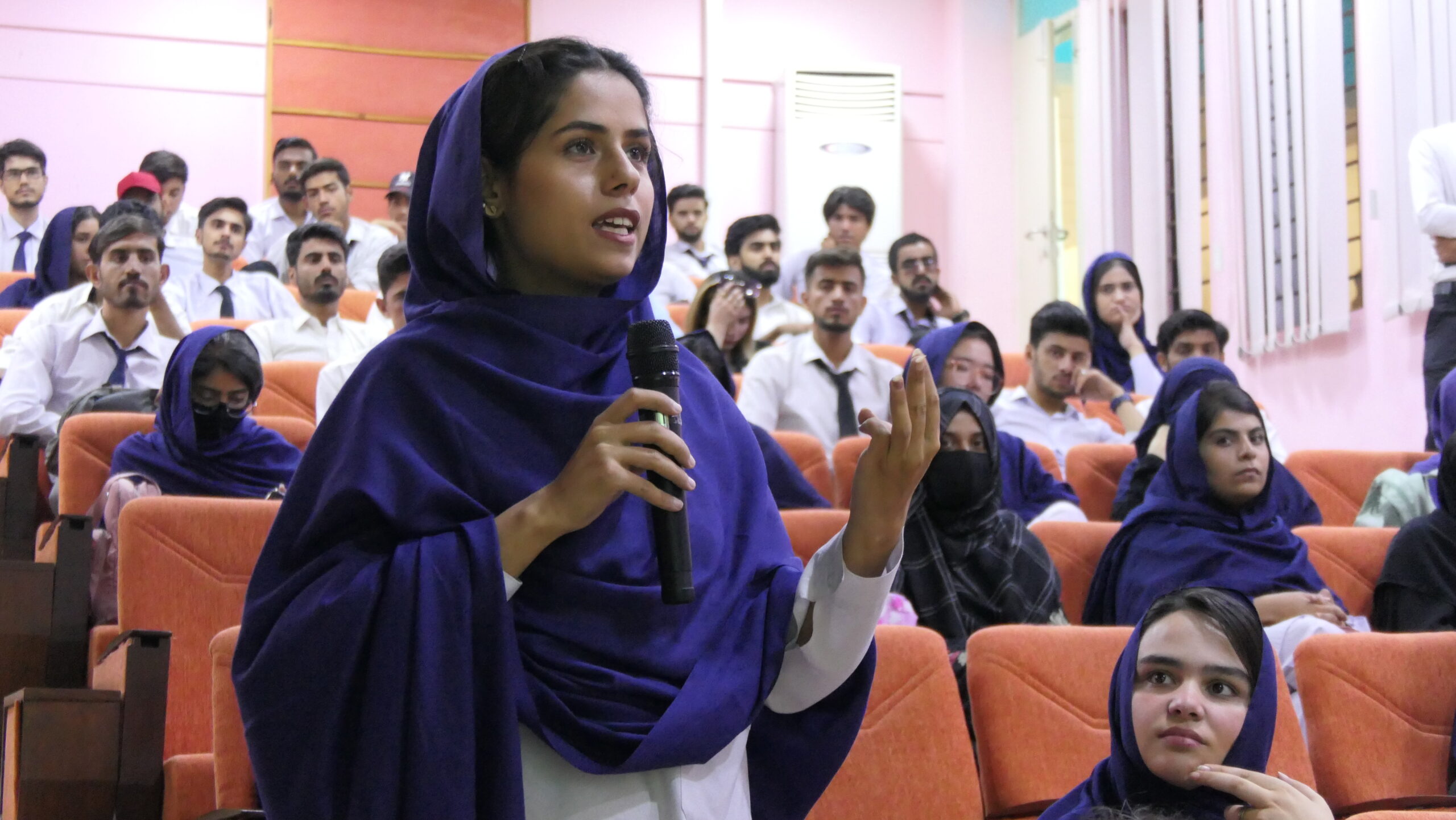
IN BRIEF
Sustainable Development Goal 16 (SDG 16) emphasizes promoting peaceful and inclusive societies, ensuring access to justice for all, and building accountable and effective institutions. SDG 16 is integral to the 2030 Agenda for Sustainable Development, aiming to promote peaceful and inclusive societies, provide access to justice for all, and build […]
SHARE
Sustainable Development Goal 16 (SDG 16) emphasizes promoting peaceful and inclusive societies, ensuring access to justice for all, and building accountable and effective institutions. SDG 16 is integral to the 2030 Agenda for Sustainable Development, aiming to promote peaceful and inclusive societies, provide access to justice for all, and build effective, accountable, and inclusive institutions at all levels.
Based on insights from the United Nation’s (UNDP, UNHCR, and UNODC) Global Progress Report on SDG 16 Indicators, this blog explores the gaps in the current implementation of SDG 16 in Pakistan, gleans insights from global experiences, and outlines a way forward.
The UN’s Global Progress Report highlights the following key components critical to the success of SDG 16: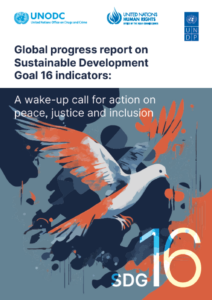
- Enhancing data collection and analysis to ensure reliable and comprehensive data.
- Strengthening institutional capacities through international cooperation and technical assistance.
- Promoting public participation and inclusive governance to foster transparency and accountability.
- Addressing gender disparities by implementing gender-responsive policies and increasing women’s representation in public service.
- Leveraging technology to enhance inclusivity in data collection and service delivery.
The socio-economic impact of these gaps is profound on an economy. Data deficiency undermines the ability to formulate effective policies and allocate resources efficiently, exacerbating poverty and inequality. Institutional weaknesses lead to corruption and ineffective service delivery, which stifle economic growth and deter investment. Limited public participation results in policies that do not reflect the needs of the population, further entrenching social inequities. Gender disparities restrict women’s access to justice and economic opportunities, perpetuating cycles of poverty and discrimination.
Critical Gaps in the Implementation of SDG 16 in Pakistan
In Pakistan, where challenges like extremism, corruption, weak justice system, data deficiency, limited public participation, poverty, poor governance, and gender disparities persist; achieving compliance with SDG 16 is not just crucial but also a shared responsibility. It holds the potential to foster long-term social and economic development, protect vulnerable populations, and strengthen the rule of law. Following gaps have far-reaching socio-economic impacts, hindering overall development, perpetuating inequality, and eroding public trust in state institutions. Failure to act could perpetuate cycles of violence, hinder economic growth, and exacerbate social inequalities.
Data Deficiency: One of the primary obstacles to effectively implementing SDG 16 in Pakistan is the lack of reliable and comprehensive data. Lack of data hinders policy-making in addressing issues such as violence, corruption, and access to justice, and it affects socio-economic development.
Institutional Weaknesses: The institutions responsible for enforcing laws and ensuring justice in Pakistan often suffer from corruption, lack of resources, and inadequate capacity of the institution and the human resources. These weaknesses undermine public trust and lead to poor service delivery, directly impacting citizens’ economic and social well-being and widening the trust gap between citizens and the state.
Limited Public Participation: In Pakistan, public participation is often limited due to a lack of public awareness about their constitutional rights and available mechanisms, restrictive laws, and a culture of apathy towards political processes. This lack of engagement leads to policies that do not reflect the needs and aspirations of the population, exacerbating social inequities and hindering inclusive development.
Gender Disparities
Women and girls in Pakistan face significant barriers to accessing justice and participating in public life. Gender-based violence, discriminatory laws, and cultural norms perpetuate gender disparities, impeding progress toward achieving the SDG 16 goals. These disparities also have economic repercussions, limiting women’s opportunities to contribute to the economy and improve their socio-economic status.
Leveraging Global Experience to Bridge the Data Gaps
Innovative Data Collection Methods: Countries like Ghana have implemented citizen data initiatives to bridge data gaps. For example, Ghana’s Public Services Satisfaction Survey app allows citizens, including those with disabilities, to provide feedback on public services. This inclusive approach enhances data collection and empowers citizens to participate in governance.
Strengthening Institutions through International Cooperation: The global fight against organized crime, corruption, and violence requires robust international cooperation. Multilateral solutions and collaborations can help countries like Pakistan strengthen their institutions by adopting best practices and receiving technical assistance from international bodies.
Colombia is an example of a country that has effectively strengthened its institutions through international cooperation. Faced with challenges like organized crime, drug trafficking, and corruption, Colombia has partnered with international partners, including the United Nations, the United States, and the European Union, to bolster its institutional capacity through Plan Colombia. Other countries facing similar issues have studied and adapted this model of international cooperation, demonstrating the potential for global partnerships to enhance institutional resilience and effectiveness in combating organized crime and corruption.
Promoting Gender Equality: Developed countries have made significant strides in gender representation in public service roles through targeted recruitment programs, gender quotas, and inclusive human resource policies. Adopting similar measures in Pakistan could help bridge the gender gap in leadership and decision-making positions.
Norway is one of the examples, often cited as a leader in gender equality, particularly in public service and corporate leadership. The country introduced a mandatory gender quota, requiring that at least 40% of board members in publicly listed companies be women. This policy has since expanded to public sector organizations, significantly increasing female representation in leadership roles.
Similarly, the appointment of a gender-balanced cabinet by Canadian Prime Minister Justin Trudeau in 2015 was a significant step towards gender equality in public service. Other countries, including Sweden and Australia, have also introduced various initiatives to achieve gender parity in leadership roles across public and private sectors.
Leveraging Technology for Inclusivity: Utilizing technology to enhance inclusivity in data collection and service delivery has proven effective in various countries. For instance, assistive technologies in data collection apps can ensure that persons with disabilities are included in governance processes, leading to more comprehensive and accurate data.
Australia has developed the National Disability Data Asset (NDDA), a cross-government initiative that integrates data from various sources to better understand the experiences of people with disabilities. The NDDA uses advanced analytics and secure data-sharing platforms to create a complete picture of their needs. This data is used to inform policy and improve service delivery, ensuring that government programs are more inclusive and responsive to the needs of all citizens.
As part of the Accessible India Campaign, the government launched a mobile app to crowdsource data on the accessibility of public spaces for persons with disabilities. The app allows users to report accessibility issues in real time, which the government then uses to improve infrastructure and services. This initiative has empowered individuals with disabilities to participate actively in governance processes and has led to better data-driven decision-making.
The European Union has implemented the Access City Award program, to collect data on accessibility and service delivery, ensuring that the needs of persons with disabilities are considered in urban planning and public services. Other initiatives, including Kenya’s Digital Accessibility Platform, are good examples of how countries like Pakistan can adapt to ensure participatory governance.
Way Forward for Pakistan
- To address the data deficiency, the government should invest in modern data collection methods to ensure that the voices of marginalized communities are heard.
- Reforming and strengthening institutions is crucial for achieving SDG 16. This includes providing sufficient resources for law enforcement and judicial bodies, training and capacity-building programs, and implementing anti-corruption measures.
- Encouraging public participation in governance can lead to more transparent and accountable institutions. Awareness campaigns, educational programs, and platforms for dialogue between the government and civil society can also foster a culture of participation.
- Implementing gender-responsive policies is essential for achieving SDG 16. This includes enforcing laws against gender-based violence, promoting gender equality in public service, and ensuring equal access to justice for women and girls. Gender quotas in political and public service roles can also help increase women’s representation in decision-making positions.
- Embracing technology can enhance inclusivity in governance processes. Developing apps and digital platforms with assistive technologies can ensure that all citizens, including those with disabilities, can participate in data collection and service delivery.
Achieving SDG 16 in Pakistan is a complex but attainable goal. By addressing the existing gaps, learning from global experiences, and adopting innovative solutions, Pakistan can make significant progress toward promoting peace, justice, and strong institutions.
Accountability Lab’s Response to the SDG 16 Gaps in Pakistan
Accountability Lab (AL) is employing a comprehensive approach to address the critical gaps in the implementation of SDG 16 in Pakistan, as highlighted in the UN’s Global Progress Report. By focusing on innovative data collection, strengthening institutional capacities, promoting public participation, addressing gender disparities, and leveraging technology, Accountability Lab is working to build peaceful and inclusive societies. AL’s initiatives, such as the SDG 16 Innovation Challenge and other targeted programs, aim to empower youth, enhance governance, and foster transparency and accountability, ensuring no one is left behind in pursuing sustainable development.
Lab, in collaboration with UNDP launched Pakistan’s first SDG 16 Innovation Challenge. The initiative invites young Pakistanis to submit innovative ideas addressing peace, justice, and accountability and foster creativity and inclusivity in pursuing SDG 16 goals.
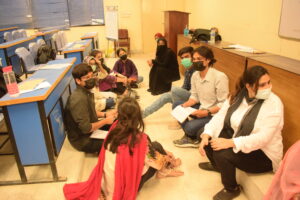
CivActs – is Accountability Lab’s flagship campaign designed to develop and strengthen citizen voice and feedback mechanisms at the local level to support ongoing monitoring, adaptation, and improvement of critical public services.
Accountability Lab, through its Youth Peace Incubator Program, has established Peace Incubation Centers (PICs) at the eight largest public-sector universities across Pakistan. The initiative has so far engaged more than 30,000 students and faculty members in various thematic activities to help develop their critical skills, such as civic engagement, peacebuilding, and responsible leadership.
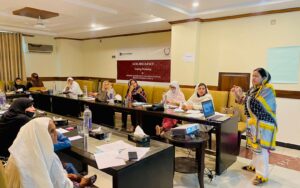
Gov-HER-Nance campaign aims to strengthen the voice of marginalized women in matters affecting their well-being and sense of agency, to shift policies that relate to issues affecting their lives, improve the delivery of support services to marginalized populations, especially women. The campaign has directly engaged over 2,500 local women leaders and over 1.5 million citizens from the most vulnerable communities across Pakistan.
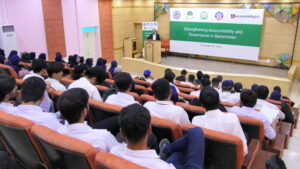
A customized management information system was developed as part of the “Strengthening Institutional Capacity of PAC Balochistan” project, resulting in the complete automation of the PAC processes for improved monitoring, reporting, compliance, and recovery. Automation has reduced processing time, fast-tracked internal and external communication, monitoring of cases, recoveries, and reporting and promote a paperless and climate-friendly environment in the public sector in Balochistan.
About the Author: Asif Farooqui is the Director of Programs at the Accountability Lab Pakistan, and can be reached at asif@accountabilitylab.org
